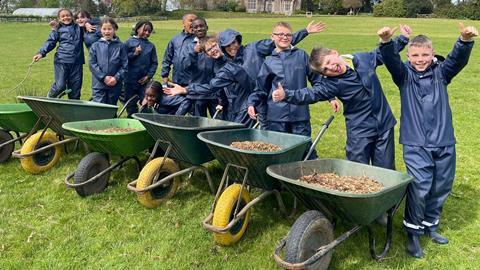Farms for City Children is now able to reach a wider range of children and young people. CEO Donna Edmonds told us about the new strategy.

Donna Edmonds certainly knows a thing or two about getting children outside of the classroom. Having been a teacher for 23 years, she’s now at the helm of Farms For City Children, a charity giving children from disadvantaged communities the chance to work together on farms in the heart of the countryside.
Her connection with the charity goes way back and led to a life-changing experience. She explained: “In November 2000, my headteacher said we’ve got this trip going to a farm and the teacher leading it doesn’t want to go. I thought, I don’t want to do that, I’m from south London and have no interest in farming.
“I sulked all the way down on the coach, I didn’t even own a waterproof or any wellies and thought it was going to be a week of hell.”
But the reality of the week at Nethercott House, Devon (one of the charity’s three sites - the others are Lower Treginnis in Pembrokeshire and Wick Court, Gloucestershire) couldn’t have been further from that.
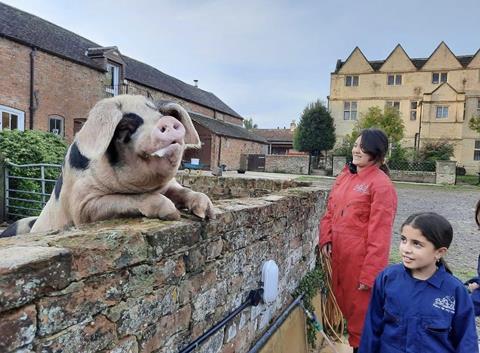
Donna said: “It changed my entire life. I didn’t know people lived like that and I didn’t know that nature could be as grand as that. It was so inspiring and it’s such a selfless way of life. I took these kids from south London, who had never even had grass under their feet, and seeing them bond and fall in love with nature was incredible.
“Quite frankly, the nature connection gap in our society is embarrassing; we’re the most nature depleted and there are so many children who haven’t been to the countryside.”
“I remember asking them what cows drunk and they replied ‘milk’ and then I held up a strawberry and they thought it was cheese because it looked like a Babybel. It hit every curriculum area as well as personal, social and cognitive development and I went back every year with the school.”
How the pandemic led to a change in strategy
Farms for City Children, founded by Clare and Michael Morpurgo, has been on its own journey in recent years with Donna telling us: “The pandemic was a truly devastating experience for the charity with job losses and plummeting school budgets.”
But with grit, determination and the support of amazing people, Donna explained how they have rebuilt: “We reopened in September 2021 and by January it had really started to pick up. I was already a trustee of the charity and became CEO in January 2022.
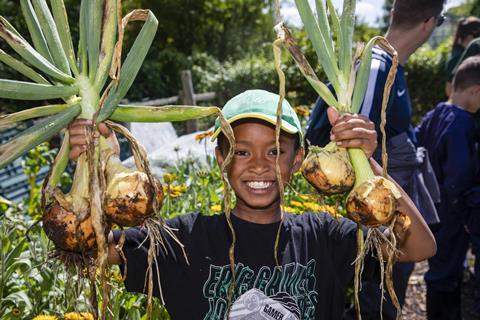
“There was such a need for teachers to bring children and immerse them in nature. As well as taking on a new team at every farm, we have embraced a new strategy.
“Previously we were open for 30 weeks and just for primary-age children. Now, we have the capacity to open 120 weeks of the year across the three farms and can work with children and young people from the age of eight to 19.
“It has been a very exciting two years and we are now reaching a wider range of children with a wider level of need, for example we’ve had more SEND children than ever before and we can offer day visits now too. It’s really important to me that more children from diverse backgrounds can get into the countryside to see that they love and enjoy it and maybe one day can even make a career from it.”
Encouraging future careers in farming
Alongside the curriculum links, a big part of the charity’s mission is to inspire future careers and as Donna pointed out, this has a direct link to our workforce in years to come.
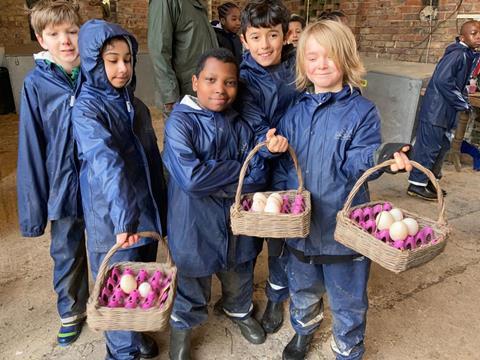
“We are sowing the seeds in young people and they’ve told us that they’re thinking of going on to land management and animal courses as a result of their visit.”
“We’ve even had people tell us that they now work in government policy as a result of coming to one of the farms, or they’re a top chef who’d never had vegetables before coming to on visit”, she told us, citing an inspiring example of a child, previously struggling at school, who is now desperate to become a farmer after a school trip.
“I took these kids from south London, who had never even had grass under their feet, and seeing them bond and fall in love with nature was incredible.”
Donna added: “We are anchored in farming. Kids come and they farm, they carry out every task that a farmer would and they learn about the cuts of meat and the price of milk.
“They experience real-life situations that link to numeracy, PSHE, citizenship and more - there’s also the wellbeing aspect and learning about climate change and sustainability. Along with the heavy duty labour tasks, the children go on biodiversity walks and in Treginnis they’ll pick up plastic on the beach and find out about marine life and the damage being done to our oceans.”
Confronting key issues and the nature gap
Donna believes we’ve got a long way to go to address the gap in how connected to nature we are. But as she pointed out, we’re heading in the right direction: “People are starting to think about the humans behind the food that they eat. It has been a long time coming. We want to continue spreading the message about how important all those people in the food and farming sectors are to our whole society.
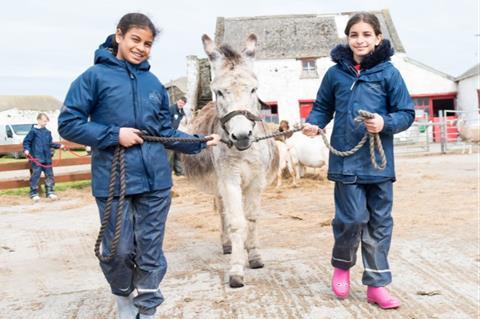
“I’m proud that we’re being confrontational with the children. Quite frankly, the nature connection gap in our society is embarrassing; we’re the most nature depleted and there are so many children who haven’t been to the countryside.”
The charity has been working to identify the geographical areas where the children would benefit the most from a farm visit and has been working with local funders and third-sector groups to make sure those children are able to access such life-changing experiences.
Donna’s passion for what the charity stands for, and enables children to do, is inspiring.
She described how “proud” she felt to be associated with Farms for City Children and how much of a “privilege” it is and the hope is that even more children and young people will get to experience life on one of the three farms, just as more than 100,000 have since it started in 1976.
For more information about Farms for City Children, and what’s available to schools, go to www.farmsforcitychildren.org






